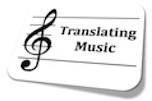18 October 2013: 2.30 - 4.30 pm, Institute for Musical Research (London, Senate House, Room G22/26)
Seminar 3: Opera, Digital Media and Translation
The singer Thomas Hampson defined songs as “the software of the soul”. Beyond this metaphor, this seminar, starting from the excerpt of a interview of Thomas Hampson on ‘Classical Music in the Digital Age’ http://www.youtube.com/watch?v=_8c5PPAqcNE discussed how digital technologies are transforming the ways we listen to opera and have contributed to making it one of the most popular classical genres in the 21st century. Ken Chalmers, Head of Surtitling at the Royal Opera House, Lydia Machell, Prima Vista Braille Music Services, a company developing Braille sheet music and libretti, and Sarah Weaver, from Durham University answered Lucile Desblache’s questions on how recent digital developments are impacting upon the dissemination but also the conception of this genre, paradoxically still elitist but also more accessible than any other musical genre, particularly for deaf and blind audiences.
Technology impacts ‘performance’ translation in its several guise. Different formats of availability (HD Live on cinema, opera on the web, on DVD…) creates different challenges for translators Those challenges are so much about how to convey information, which is made possible by new technologies. Rather, the challenge is to choose how much information to convey to maximise the meaning of the operatic performance overall. With regards to deaf and blind audiences, panellists agreed that current ways of providing access to opera (audio-introduction, audio-description, different ways of accessing surtitles…) are still experimental to a degree and that, in many respects, we are only at the beginning of new developments.
The question of how technological developments can bring inclusion, but also exclusion, particularly for audiences with a degree of impairment, was also breeched on during the debate.
Below is the interview of a blind opera lover who explains why a Braille libretti allows a much better experience of opera that an audio-described performance in her opinion (add ‘Braille at the opera’ clip)
The following sites can also be accessed:
A short film about Prima Vista and braille music:
http://www.guardian.co.uk/society/video/2011/feb/15/braille-music-blind-people-video
Information on the Visually Impaired Musicians' Lives research project: http://vimusicians.ioe.ac.uk/
-----------------------------------------------------------------------------


